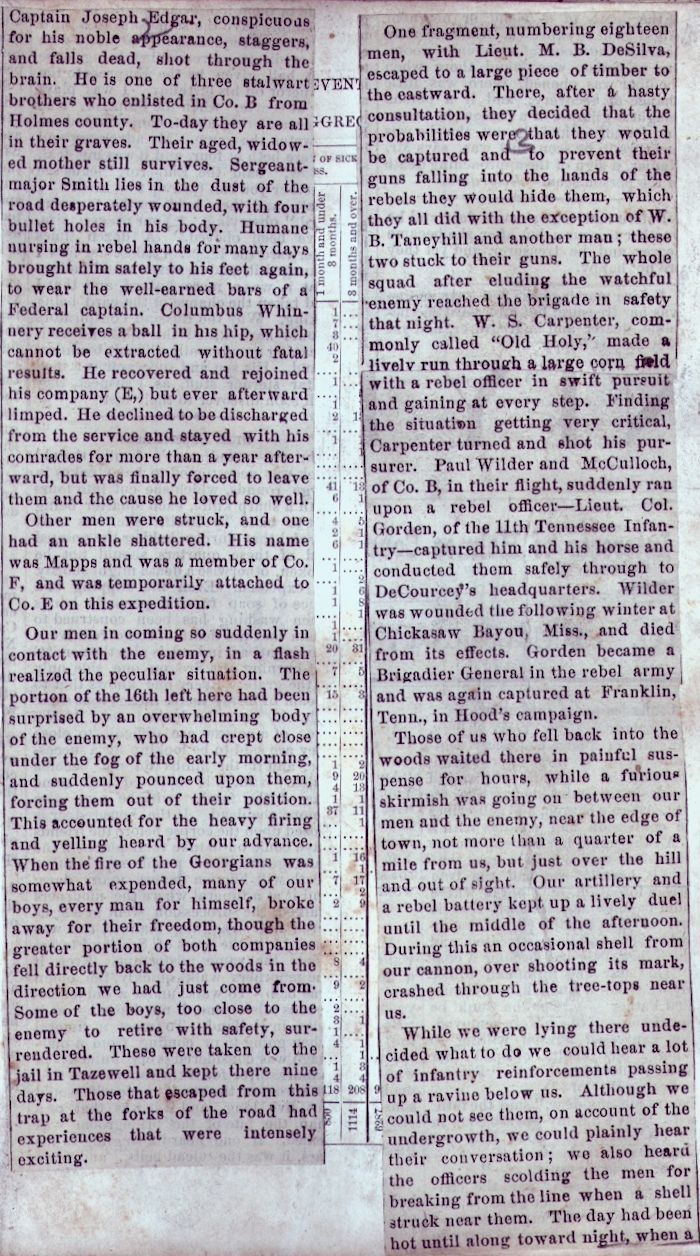| Camp & Field Page 26 | Camp & Field Index Page | 16th OVI Home Page | Camp & Field Page 28 |
The Camp & FieldArticles by Theodore Wolbach |
 Cpl. Theodore D. Wolbach |
The following image is taken from a book titled "Mortality and Statistics of the Census of 1850" in which it is believed retired Captain Rezin H. Vorhes, Company H, pasted over the pages a series of articles written by Cpl. Theodore D. Wolbach, Company E, titled "Camp and Field" and published, by chapter, in the Holmes County (Ohio) Republican newspaper from February 24, 1881 to August 17, 1882. The articles tell the story, in great detail and color, of the 16th OVI, from the inception of the 3-year regiment in October, 1861, through all its camps, battles and marches until it was disbanded on October 31, 1864. The articles pasted in the Vorhes book cover the first 35 chapters, published through October 20, 1881. All the remaining chapters were recently found in a Holmes County library by researcher Rob Garber who obtained copies, performed the transcriptions and provided to this website and which are also presented here, thus providing the complete work by Theodore Wolbach.
Throughout these articles click on the underlined white text for additional details.
The webauthor thanks 16th Ohio descendant Rob Garber for his excellent research on the Camp And Field articles and for performing the tedious digital transcription of those articles found on each page. The transcriptions were made to reflect the original articles verbatim, misspellings and all. Rob is the 3rd great nephew of Capt. William Buchanan, Company F, 16th Ohio, who served in the 90-day regiment as a private, re-enlisting in the three year regiment, and eventually making the rank of Captain of Company F. Thanks Rob!
Page 27 - Chapter 16 - August, 1862
 |
Captain Joseph Edgar, conspicuous for his noble appearance, staggers, and falls dead, shot through the brain. He is one of three stalwart brothers who enlisted in Co. B from Holmes county. To-day they are all in their graves. Their aged, widowed mother still survives. Sergeant-major Smith lies in the dust of the road desperately wounded, with four bullet holes in his body. Humane nursing in rebel hands for many days brought him safely to his feet again, to wear the well-earned bars of a Federal captain. Columbus Whinnery receives a ball in his hip, which cannot be extracted without fatal results. He recovered and rejoined his company (E,) but ever afterward limped. He declined to be discharged from the service and stayed with his comrades for more than a year afterward, but was finally forced to leave them and the cause he loved so well. Other men were struck, and one had an ankle shattered. His name was Mapps and was a member of Co. F, and was temporarily attached to Co. E on this expedition. Our men in coming so suddenly in contact with the enemy, in a flash realized the peculiar situation. The portion of the 16th left here had been surprised by an overwhelming body of the enemy, who had crept close under the fog of the early morning, and suddenly pounced upon them, forcing them out of their position. This accounted for the heavy firing and yelling heard by our advance. When the fire of the Georgians was somewhat expended, many of our boys, every man for himself, broke away for their freedom, though the greater portion of both companies fell directly back to the woods in the direction we had just come from. Some of the boys, too close to the enemy to retire with safety, surrendered. These were taken to the jail in Tazewell and kept there nine days. Those that escaped from this trap at the forks of the road had experiences that were intensely exciting. |
One fragment, numbering eighteen men, with Lieut. M.B. DeSilva, escaped to a large piece of timber to the eastward. There, after a hasty consultation, they decided that they probabilities were that they would be captured and to prevent their guns falling into the hands of the rebels they would hide them, which they all did with the exception of W.B. Taneyhill and another man; those two stuck to their guns. The whole squad after eluding the watchful enemy reached the brigade in safety that night. W.S. Carpenter, commonly called Those of us who fell back into the woods waited there in painful suspense for hours, while a furious skirmish was going on between our men and the enemy, near the edge of town, not more than a quarter of a mile from us, but just over the hill and out of sight. Our artillery and a rebel battery kept up a lively duel until the middle of the afternoon. During this an occasional shell from our cannon, over shooting its mark, crashed through the tree-tops near us. While we were lying there undecided what to do we could hear a lot of infantry reinforcements passing up a ravine below us. Although we could not see them, on account of the undergrowth, we could plainly hear their conversation; we also heard the officers scolding the men for breaking from the line when a shell struck near them. The day had been hot until along toward night, when a |
| Camp & Field Page 26 | Camp & Field Index Page | 16th OVI Home Page | Camp & Field Page 28 |